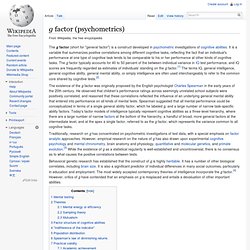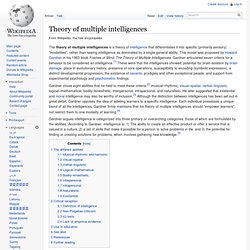

For the First Time, Scientists Identify Genes In The Brain Linked To Human Intelligence. Wired What creates intelligence?

Are the super-smart intelligent because of the way that their brains are wired? Is it because of genes, or is it just because of the way that they were raised? Now, we have new information to help us answer these complicated questions. Intelligent people have 'unnatural' preferences and values that are novel in human evolution. More intelligent people are significantly more likely to exhibit social values and religious and political preferences that are novel to the human species in evolutionary history.

Specifically, liberalism and atheism, and for men (but not women), preference for sexual exclusivity correlate with higher intelligence, a new study finds. The study, published in the March 2010 issue of the peer-reviewed scientific journal Social Psychology Quarterly, advances a new theory to explain why people form particular preferences and values. Brain Images Reveal the Secret to Higher IQ. New research suggests that the layer of insulation coating neural wiring in the brain plays a critical role in determining intelligence.

In addition, the quality of this insulation appears to be largely genetically determined, providing further support for the idea that IQ is partly inherited. The findings, which result from a detailed study of twins’ brains, hint at how ever-improving brain-imaging technology could shed light on some of our most basic characteristics. “The study answers some very fundamental questions about how the brain expresses intelligence,” says Philip Shaw, a child psychiatrist at the National Institute of Mental Health, in Bethesda, MD, who was not involved in the research.
The neural wires that transmit electrical messages from cell to cell in the brain are coated with a fatty layer called myelin. Thompson and his colleagues took DTI scans of 92 pairs of fraternal and identical twins. G factor (psychometrics) The g factor (short for "general factor") is a construct developed in psychometric investigations of cognitive abilities.

It is a variable that summarizes positive correlations among different cognitive tasks, reflecting the fact that an individual's performance at one type of cognitive task tends to be comparable to his or her performance at other kinds of cognitive tasks. The g factor typically accounts for 40 to 50 percent of the between-individual variance in IQ test performance, and IQ scores are frequently regarded as estimates of individuals' standing on the g factor.[1] The terms IQ, general intelligence, general cognitive ability, general mental ability, or simply intelligence are often used interchangeably to refer to the common core shared by cognitive tests.[2]
Summary of topic Intelligence g Factor. Theory of multiple intelligences. The theory of multiple intelligences is a theory of intelligence that differentiates it into specific (primarily sensory) "modalities", rather than seeing intelligence as dominated by a single general ability.

This model was proposed by Howard Gardner in his 1983 book Frames of Mind: The Theory of Multiple Intelligences. Gardner articulated seven criteria for a behavior to be considered an intelligence.[1] These were that the intelligences showed: potential for brain isolation by brain damage, place in evolutionary history, presence of core operations, susceptibility to encoding (symbolic expression), a distinct developmental progression, the existence of savants, prodigies and other exceptional people, and support from experimental psychology and psychometric findings. Gardner argues intelligence is categorized into three primary or overarching categories, those of which are formulated by the abilities. The different abilities[edit] Musical–rhythmic and harmonic[edit] Interpersonal[edit]
Types of Intelligence-IQ, EQ,MQ,BQ. Howard Gardner’s seven types of intelligence guide us in selecting child specific teaching methods and career.

There are other types of intelligence which parents and teachers should develop in children, to prepare them to face the world independently. Earlier psychologists termed this as “Social intelligence”- the ability to get along with other people. Usually we feel that a child with a high IQ (Intelligence Quotient- measurement of intelligence) will have a bright future. But there are many examples in the real world where we find that people who had been average students are more succesful and happy with their life and career. This is because when a person enters the professional world independently, she/he is faced with myriad situations and people dealing which is not taught in regular school syllabus.
Average IQ in US and 80 other nations. The average IQ in the United States is usually set at 100.

Groups within the US score different average IQ's, such as 115 for college grads or 85 for African-Americans. Similarly, average IQ varies from country to country, shown in the 2002 book IQ and the Wealth of Nations (sets Britain at 100): The top 5 nations above were also the top scorers (different order) in 8th grade math and science in 2003.
Low IQ & Conservative Beliefs Linked to Prejudice. There's no gentle way to put it: People who give in to racism and prejudice may simply be dumb, according to a new study that is bound to stir public controversy.

The research finds that children with low intelligence are more likely to hold prejudiced attitudes as adults. These findings point to a vicious cycle, according to lead researcher Gordon Hodson, a psychologist at Brock University in Ontario. Low-intelligence adults tend to gravitate toward socially conservative ideologies, the study found. Those ideologies, in turn, stress hierarchy and resistance to change, attitudes that can contribute to prejudice, Hodson wrote in an email to LiveScience. "Prejudice is extremely complex and multifaceted, making it critical that any factors contributing to bias are uncovered and understood," he said. Controversy ahead The findings combine three hot-button topics.